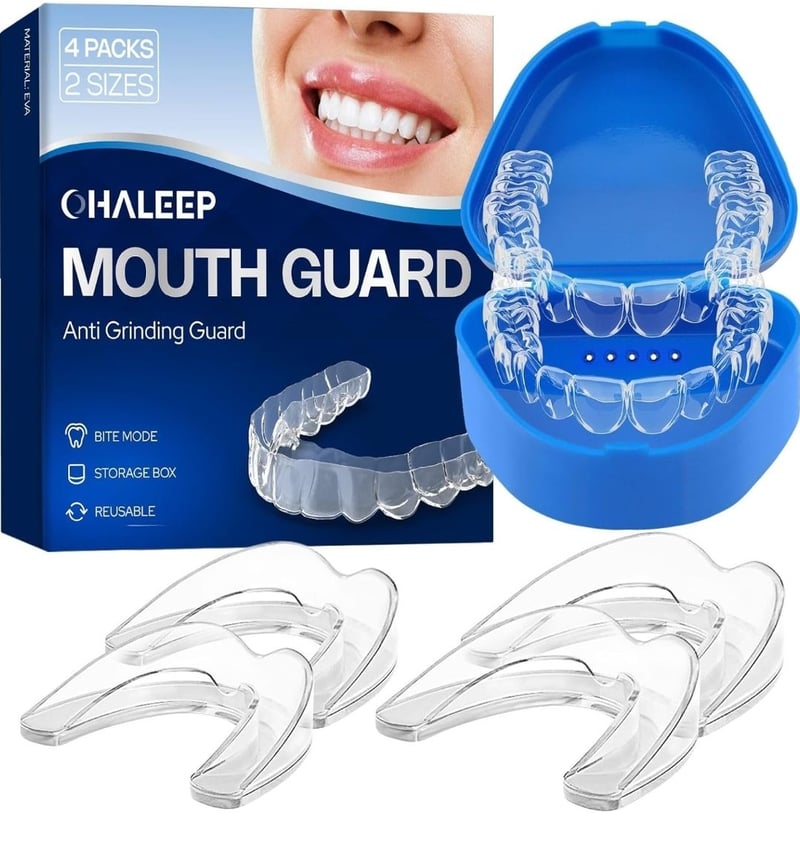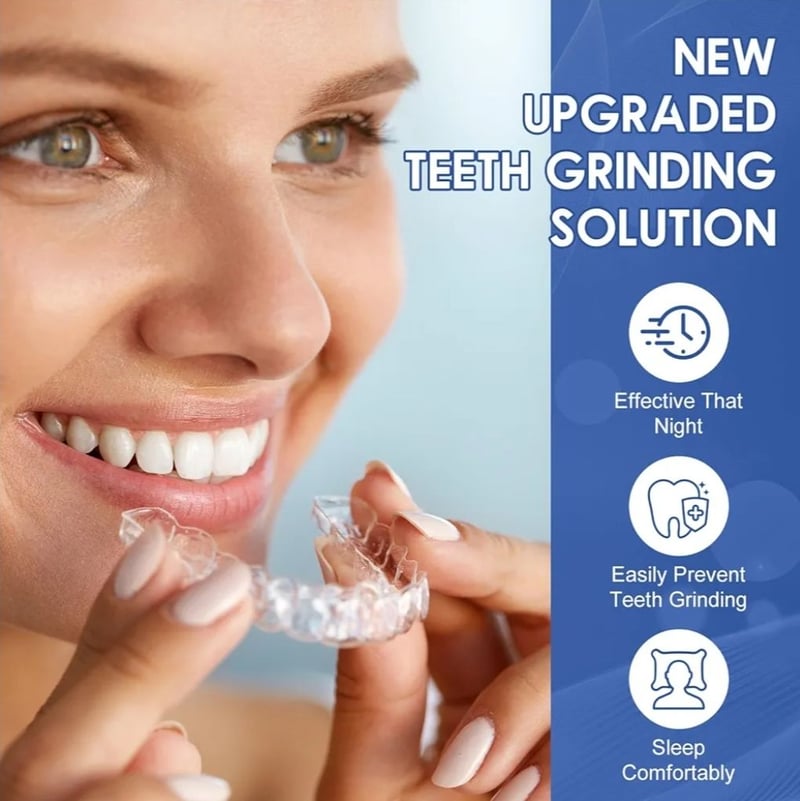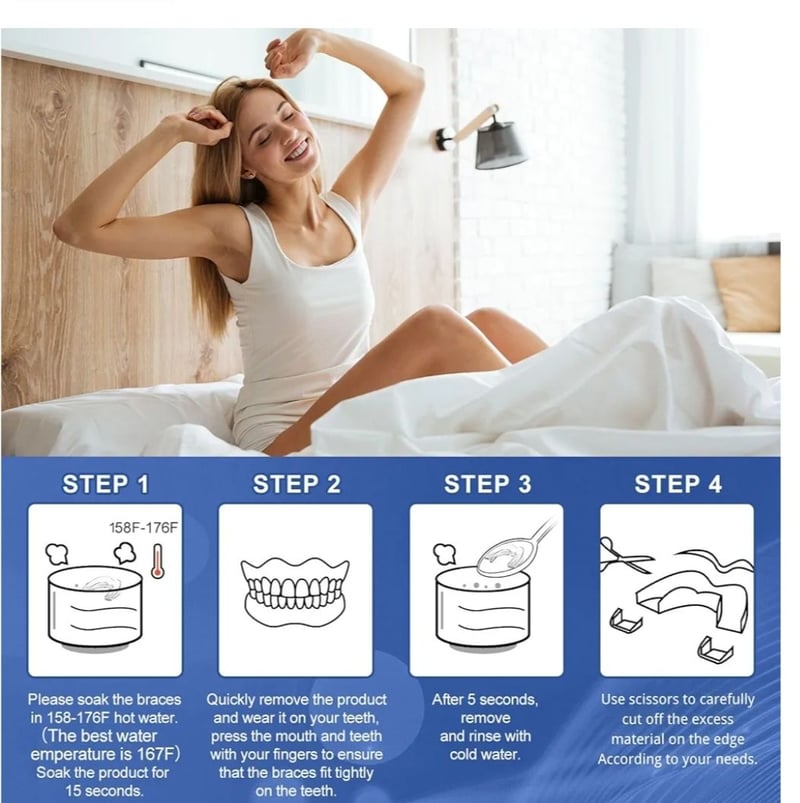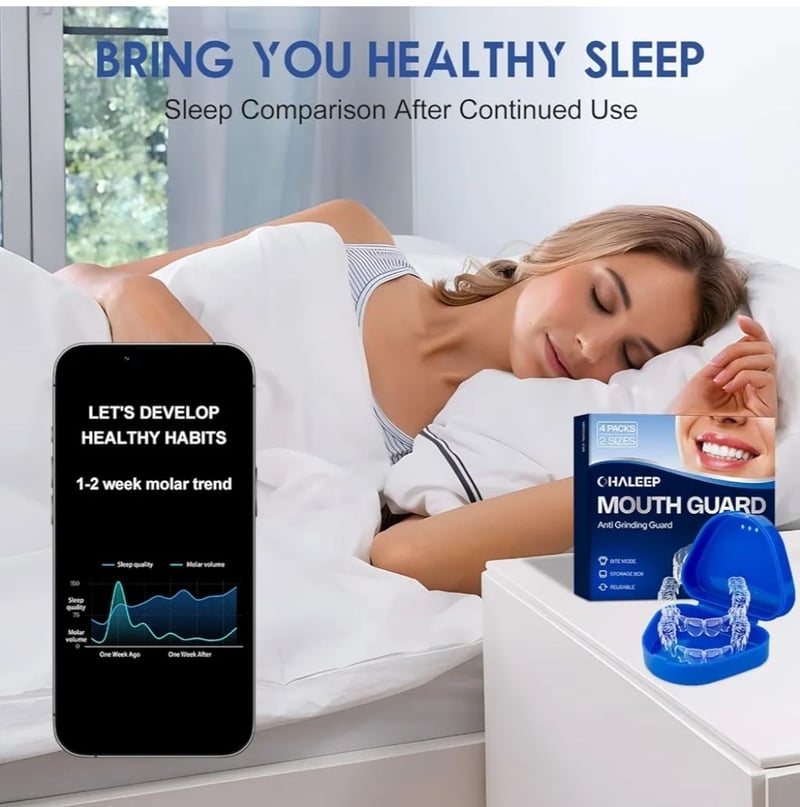Use Code “SAVE10” At Checkout To Get A 10% Discount
How To Stop Teeth Grinding In Sleep Anti-bruxism Mouth Guard Jamaica
Table of Contents
- What is Teeth Grinding and Why Does It Happen?
- How Mouthguards Help with Bruxism
- Choosing the Right Mouthguard for You
- How to Properly Use a Mouthguard
- Tips for Improving Sleep Quality with Mouthguards
- Emotional Impact of Teeth Grinding on Sleepers
- Real Stories: How Mouthguards Changed Lives
- Frequently Asked Questions about Mouthguards
- Where to Order Your Mouthguard Online

Mouthguards can be a simple solution if you’re dealing with teeth grinding, also known as bruxism. Using a mouthguard while you sleep helps cushion your teeth, preventing damage and reducing jaw pain. First, it's important to choose the right kind—custom-fitted options from your dentist work best, but there are also over-the-counter varieties available. Wearing one nightly might feel strange at first, but many find it brings peace of mind and better sleep over time. While coping with bruxism can be tough emotionally and physically, finding relief through mouthguards is a step towards healthier dental habits that could make a difference in your life.
What is Teeth Grinding and Why Does It Happen?
Teeth grinding, known as bruxism, occurs when a person clenches or grinds their teeth, often during sleep. This habit can lead to various dental issues and even affect overall health. Many people are unaware they grind their teeth until they experience symptoms like jaw pain, headaches, or worn-down teeth. The reasons behind bruxism can vary widely. Stress and anxiety are common triggers, as they lead to muscle tension that manifests during sleep. Some people may also grind their teeth due to misaligned teeth or a sleep disorder such as sleep apnea. Lifestyle factors, like excessive caffeine or alcohol intake, can further exacerbate the problem. For example, if someone is under a lot of stress at work, they might find themselves grinding their teeth at night without even realizing it. Understanding these causes is the first step in addressing the issue.
How Mouthguards Help with Bruxism
Mouthguards play a crucial role in alleviating the discomfort associated with bruxism, or teeth grinding. By providing a barrier between the upper and lower teeth, these devices help to absorb the force generated during grinding, reducing the risk of tooth wear and damage. Additionally, mouthguards can help to relax the jaw muscles, which may alleviate the tension that often accompanies this condition. For example, a person who grinds their teeth at night might wake up with a sore jaw or headaches; a mouthguard can mitigate these symptoms by redistributing the pressure more evenly. This not only protects the teeth but also promotes a more restful night’s sleep. Over time, consistent use of a mouthguard can lead to fewer headaches and less jaw pain, helping individuals reclaim their quality of life.
Choosing the Right Mouthguard for You
When selecting a mouthguard, it’s essential to consider the type that best suits your needs. There are three main categories: stock, boil-and-bite, and custom-fitted mouthguards. Stock mouthguards are pre-made and ready to wear, but they often lack comfort and can be bulky. Boil-and-bite options allow you to soften the material in hot water and mold it to your teeth for a better fit. However, custom-fitted mouthguards, made by a dentist from impressions of your teeth, provide the best comfort and protection.
Think about your budget as well. While custom mouthguards tend to be pricier, they often last longer and provide superior protection, making them a worthwhile investment for many. Additionally, keep your specific symptoms in mind. If you experience severe bruxism, a thicker mouthguard might be necessary to absorb more pressure. It’s also crucial to select a material that feels comfortable in your mouth; some people prefer softer materials, while others might need something firmer for better support.
Lastly, consider lifestyle factors. If you’re active in sports or have a tendency to clench during the day, a more robust mouthguard may be beneficial. Don’t hesitate to consult with your dentist, as they can provide valuable insights tailored to your unique situation.
How to Properly Use a Mouthguard
To get the most out of your mouthguard, start by ensuring it fits correctly. A proper fit is crucial for comfort and effectiveness. If you're using a custom mouthguard, your dentist will help you get the right shape. For boil-and-bite types, follow the instructions carefully: heat the guard in boiling water, let it cool slightly, and then bite down to mold it to your teeth. Make sure it covers your upper teeth and feels snug but not too tight.
Once you have the mouthguard ready, practice wearing it for short periods during the day to get used to the feel. This will help you adapt before trying it overnight. When bedtime comes, rinse the mouthguard with water or a mild mouthwash to keep it clean. Place it in your mouth and ensure it’s seated correctly, adjusting if necessary.
After using it, clean the mouthguard again with cool water and store it in a ventilated case. Avoid hot water, as it can warp the shape. Regularly check for signs of wear and tear; if it starts to feel uncomfortable or doesn't fit well anymore, it may be time for a replacement. Keeping up with maintenance can make a big difference in your comfort and effectiveness in managing bruxism.
Tips for Improving Sleep Quality with Mouthguards
To enhance your sleep quality while using a mouthguard, try establishing a calming bedtime routine. This could include activities like reading or gentle stretching, which help signal your body that it's time to wind down. Additionally, create a comfortable sleeping environment. Ensure your bedroom is dark, cool, and quiet, as these factors can significantly impact your ability to drift off peacefully.
Consider using relaxation techniques before bed. Deep breathing exercises or mindfulness meditation can reduce anxiety and tension, making it easier to fall asleep. If you find that your mouthguard feels uncomfortable at first, give yourself time to adjust. Wearing it consistently can help your mouth get used to it, leading to better sleep over time.
It's also helpful to track your sleep patterns. Using a sleep diary or an app can provide insights into how well you're sleeping with the mouthguard. This information can be useful if you need to discuss your experience with a dental professional. Lastly, don't hesitate to reach out to your dentist if you're experiencing persistent discomfort or if sleep issues continue; they can provide tailored advice or adjustments.
- Establish a consistent sleep schedule.
- Create a calming bedtime routine.
- Ensure your sleep environment is comfortable and dark.
- Avoid caffeine and heavy meals before bedtime.
- Practice relaxation techniques, such as deep breathing or meditation.
- Keep electronic devices out of the bedroom.
- Consider using white noise or calming sounds to help you sleep.
Emotional Impact of Teeth Grinding on Sleepers
Teeth grinding, or bruxism, can take a toll not just on dental health but also on emotional well-being. For many, the anxiety of waking up with sore jaws or headaches can lead to a cycle of stress that disrupts sleep quality. Imagine lying in bed, knowing that your body might betray you with tension and discomfort. This constant worry can manifest in irritability and fatigue during the day, affecting relationships and productivity.
Those who grind their teeth might find themselves feeling isolated. It’s not easy to share the struggle of bruxism, and this can lead to feelings of embarrassment. The emotional burden often weighs heavier than the physical pain, creating a sense of hopelessness. For some, the act of grinding teeth becomes a nightly reminder of stressors that are difficult to manage.
Using a mouthguard can help alleviate these feelings by providing a sense of control over the situation. Knowing that you’re taking a proactive step can be empowering and reduce anxiety around sleep. With a mouthguard in place, you might wake up feeling refreshed instead of anxious, helping to restore a sense of normalcy and joy to your daily life.
Real Stories: How Mouthguards Changed Lives
Many people have found relief from teeth grinding thanks to mouthguards, and their stories are truly inspiring. Take Sarah, for example. After struggling with chronic headaches and jaw pain for years, she finally decided to try a mouthguard. Within weeks, she noticed a significant reduction in her symptoms. Not only did her headaches diminish, but she also felt more rested in the mornings. Her experience encouraged her friends to consider mouthguards as well.
Then there's Tom, who used to wake up every morning feeling drained. His sleep was interrupted by the grinding sounds he made at night. After getting fitted for a custom mouthguard, he found not only peace during his sleep but also a new zest for life. He started exercising again and even picked up hobbies he had neglected.
These stories highlight how mouthguards can transform lives by alleviating the physical and emotional toll of bruxism. Each person’s journey is unique, but the common thread is the relief and renewed hope they found through a simple dental device.
Frequently Asked Questions about Mouthguards
Mouthguards are often a source of curiosity for those dealing with teeth grinding. One common question is, "Do mouthguards really work for bruxism?" They can be quite effective in preventing damage to teeth and alleviating pain, but results can vary from person to person. Another frequent inquiry is about comfort:
"Are mouthguards uncomfortable to wear at night?" While some people may initially find them odd, most adapt after a few nights. It’s also important to ask,
"How long do I need to wear a mouthguard?" Generally, they should be worn every night, especially during times of stress or anxiety when grinding may worsen. People often wonder about cleaning, too:
"How should I care for my mouthguard?" Regular cleaning with mild soap and water, and storing it in a protective case, can help maintain its lifespan. Lastly, some might question, "Can I use a mouthguard if I wear braces?" Yes, there are specific mouthguards designed for those with orthodontic work, ensuring protection without interfering with dental appliances.
Where to Order Your Mouthguard Online
Finding the right mouthguard online can feel overwhelming, especially with so many options available. Start by checking reputable dental supply websites, as they often offer custom-fit mouthguards designed specifically for bruxism. Brands like Sporting Smiles and Smile Brilliant provide easy-to-use impression kits that you can complete at home, ensuring a snug fit while you sleep. If you prefer a more budget-friendly option, many online retailers like Amazon also stock boil-and-bite mouthguards, which can be molded to your teeth. Remember to read customer reviews to gauge the effectiveness and comfort of the mouthguard you're considering. It’s crucial to choose one that suits your needs, so take your time to explore the options and find the best fit for you. Order a custom mouthguard here
Frequently Asked Questions
1. What causes teeth grinding during sleep?
Teeth grinding, or bruxism, can be caused by stress, anxiety, sleep disorders, or even misaligned teeth. It often happens unconsciously while you're asleep.
2. How do mouthguards help with teeth grinding?
Mouthguards create a cushion between your teeth, preventing them from grinding against each other. This can help reduce discomfort and protect your teeth from damage.
3. Are all mouthguards the same for teeth grinding?
No, there are different types of mouthguards. Some are made for sports, while others are specifically designed for bruxism. Custom-fitted mouthguards are often more effective and comfortable.
4. How can I tell if I need a mouthguard for grinding my teeth?
If you frequently wake up with a sore jaw, headaches, or worn teeth, you might need a mouthguard. Consulting a dentist can help determine the best option for you.
5. Can I buy a mouthguard over-the-counter, or should I see a dentist?
You can find over-the-counter mouthguards, but getting a custom one from a dentist is usually better. A custom fitting ensures it fits well and offers the right protection.
Teeth grinding, or bruxism, affects many people during sleep, often due to stress, misalignment, or other factors. Mouthguards provide relief by cushioning teeth and preventing damage. When selecting a mouthguard, consider comfort and fit. Proper usage is key, so follow guidance for effective results.
Enhancing sleep quality can be achieved with good sleep habits and relaxation techniques. The emotional toll of bruxism can be significant, affecting overall well-being, but many have found success with mouthguards. For your convenience, various options to order mouthguards online are available at Shop Sales Ja Online Store.
Display prices in:USD



